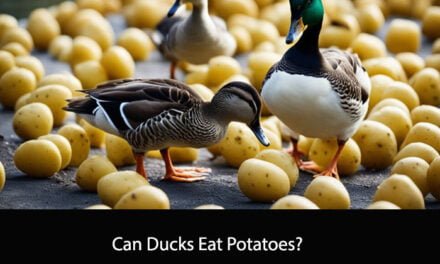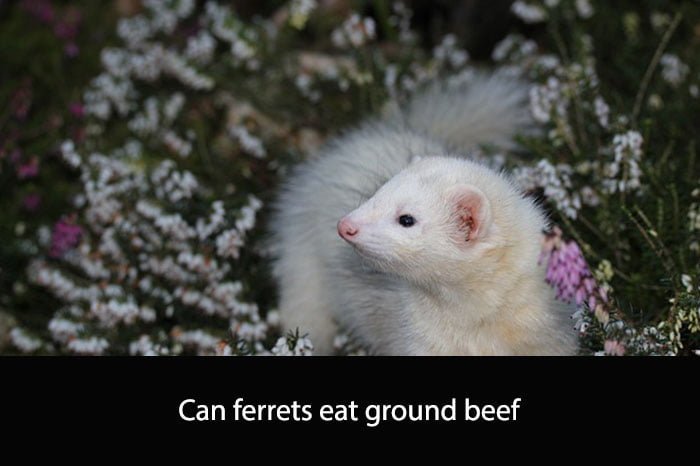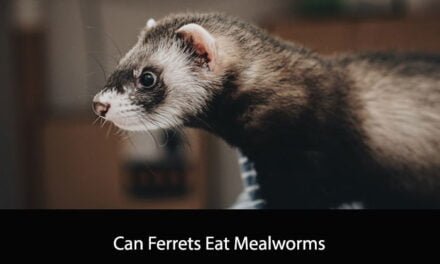Ferrets are curious and playful animals that require a well-balanced diet to maintain good health. As carnivores, their diet should consist mainly of meat-based protein, but they may also enjoy occasional treats. One question that often arises is whether ferrets can eat bugs, and if so, which types are safe for them.
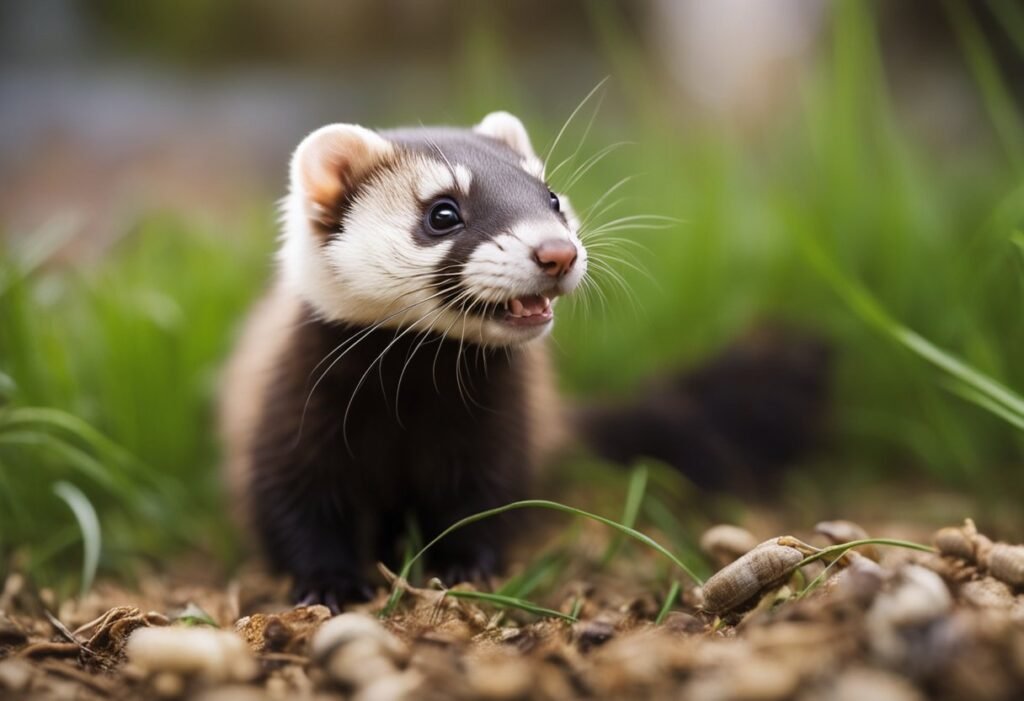
In general, ferrets can eat certain types of bugs, but it is important to be cautious and selective about which ones they consume. Some bugs may be harmful or toxic to ferrets, while others may not provide any nutritional value. Additionally, feeding too many bugs to a ferret can upset their digestive system and lead to health problems.
To ensure the safety and health of your pet ferret, it is important to research and carefully select which bugs to offer as treats. This article will explore the different types of bugs that ferrets can eat, as well as the potential risks and benefits of including bugs in their diet.
Can Ferrets Eat Bugs
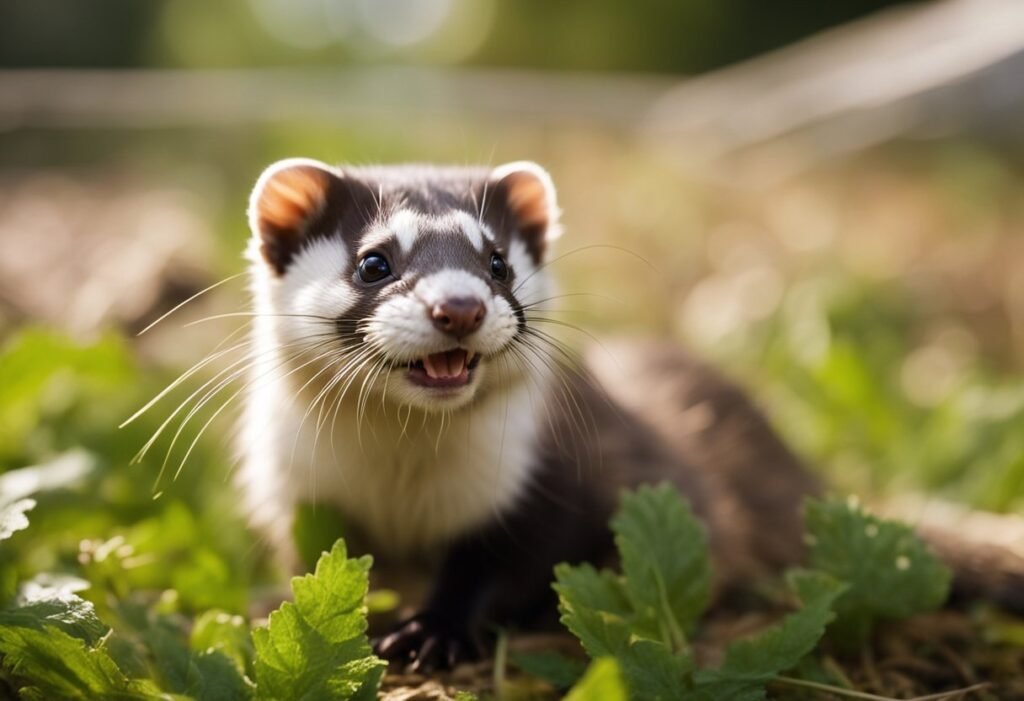
Ferrets are obligate carnivores, which means their diet should primarily consist of meat. However, they can eat small amounts of other foods, including bugs. In fact, some ferret owners may even offer their pets insects as a treat.
While bugs may be a source of protein and other nutrients for ferrets, it’s important to keep in mind that not all bugs are safe for them to eat. Some bugs, such as fireflies and ladybugs, are toxic to ferrets and should be avoided.
If you decide to offer bugs to your ferret, it’s important to choose safe options. Mealworms, crickets, and waxworms are all commonly fed to ferrets and are generally safe in moderation. However, it’s important to ensure that the bugs are gut-loaded before feeding them to your ferret. Gut-loading means feeding the bugs a nutritious diet before offering them to your pet, ensuring that your ferret is getting the most nutritional benefit from the bugs.
It’s also important to keep in mind that bugs should not make up a significant portion of your ferret’s diet. While they may be a fun treat for your pet, they should not replace the high-quality meat-based diet that ferrets require for optimal health.
Ferrets Dietary Basics
Obligate Carnivores
Ferrets are obligate carnivores, meaning they require a diet that is primarily made up of animal protein. In the wild, ferrets hunt and eat small prey such as rodents, rabbits, and birds. Their digestive system is adapted to digest and absorb nutrients from animal-based foods, which are high in protein and fat.
As pets, ferrets should be fed a diet that is specifically formulated for their nutritional needs. Commercial ferret food is available in both dry and wet forms and is typically made from a combination of poultry, fish, and other animal-based ingredients. It is important to read the label and choose a food that is high in protein and low in carbohydrates.
Natural Prey and Hunting Instincts
Ferrets have a strong natural prey drive and hunting instincts. They are known to kill and eat insects, including bugs. While bugs may be a natural part of a ferret’s diet in the wild, it is not necessary to feed them to pet ferrets.
Feeding insects to pet ferrets can be risky, as some insects may carry parasites or toxins that can be harmful to the ferret. It is best to stick to a diet that is specifically formulated for their nutritional needs and avoid feeding them any human food or table scraps.
In conclusion, ferrets are obligate carnivores and require a diet that is primarily made up of animal protein. While they may eat insects in the wild, it is not necessary to feed them to pet ferrets and may even be harmful. Choosing a high-quality commercial ferret food and avoiding human food or table scraps is the best way to ensure that your pet ferret receives a balanced and nutritious diet.
Insects as a Food Source
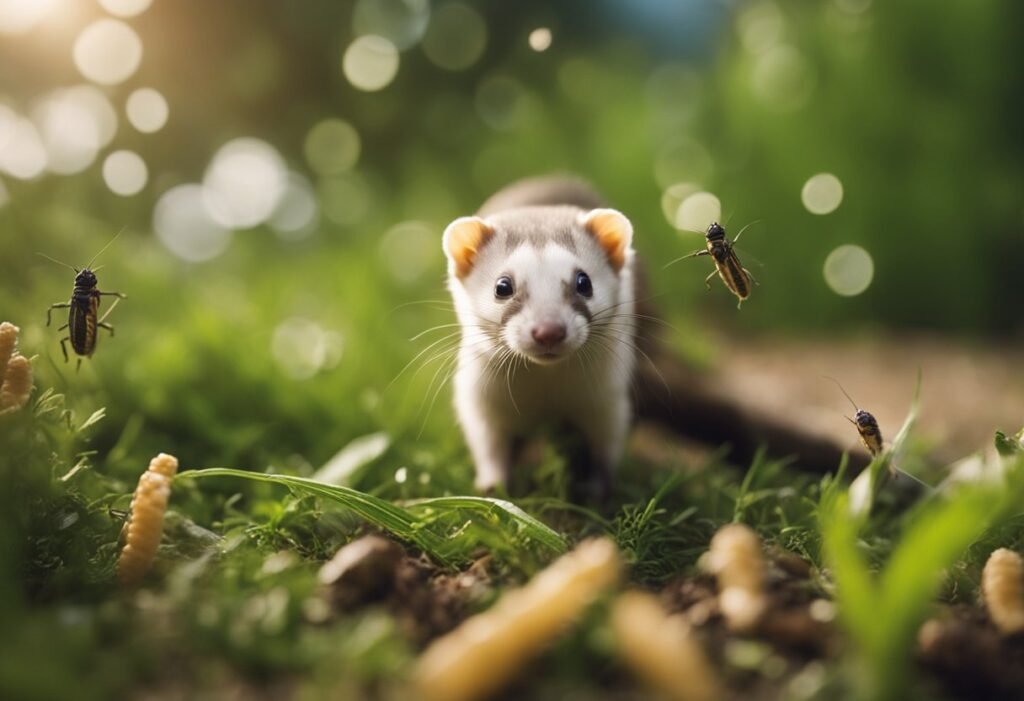
Ferrets are obligate carnivores, meaning that they require a diet rich in animal protein to thrive. While many ferret owners choose to feed their pets commercial ferret food or raw meat, some also incorporate insects into their ferret’s diet. Insects can provide a source of protein and other nutrients that can benefit a ferret’s health.
Nutritional Value of Bugs
Insects are a rich source of protein, which is essential for building and repairing muscles in ferrets. They also contain other important nutrients such as vitamins, minerals, and amino acids. For example, crickets are high in calcium, which can help support strong bones in ferrets. Mealworms are a good source of vitamin B12, which is important for healthy nerve function.
Common Edible Insects for Ferrets
There are many types of insects that can be safely fed to ferrets. Some common options include:
- Crickets: These are a popular choice due to their high protein content and availability.
- Mealworms: These are a good source of protein and other nutrients, and can be purchased live or freeze-dried.
- Dubia roaches: These are a nutritious and easy-to-digest option that can be purchased in various sizes.
- Waxworms: These are high in fat and should be fed sparingly, but can be a tasty treat for ferrets.
When feeding insects to ferrets, it’s important to ensure that they are gut-loaded, meaning that they have been fed a nutritious diet themselves. Insects can also be dusted with supplements such as calcium or vitamin D3 to ensure that ferrets are getting all the nutrients they need.
Overall, insects can be a healthy and enjoyable addition to a ferret’s diet. However, it’s important to consult with a veterinarian or do thorough research before introducing any new foods to a ferret’s diet.
Safety Considerations
Parasites and Pesticides
When feeding bugs to ferrets, it is important to consider the potential risks associated with parasites and pesticides. Bugs may carry harmful parasites, such as mites and fleas, which can be transmitted to ferrets. Additionally, some bugs may have come into contact with pesticides, which can be toxic to ferrets if ingested.
To minimize the risk of parasites and pesticides, it is recommended to only feed ferrets bugs that have been bred specifically for consumption or that have been purchased from a reputable source. It is also important to thoroughly wash and inspect any bugs before feeding them to ferrets.
Choking Hazards
Another safety consideration when feeding bugs to ferrets is the risk of choking. Ferrets have small throats and can easily choke on larger bugs or bug parts. It is important to choose appropriately sized bugs for ferrets and to remove any large or hard parts before feeding.
To reduce the risk of choking, it is also recommended to supervise ferrets while they are eating bugs and to provide plenty of fresh water for them to drink. If a ferret does choke on a bug, it is important to seek veterinary care immediately.
Overall, while bugs can be a nutritious and tasty addition to a ferret’s diet, it is important to consider the potential safety risks and take appropriate precautions to ensure the health and well-being of your pet.
Incorporating Insects Into Diet
Frequency and Quantity
Incorporating insects into a ferret’s diet can provide essential nutrients and variety in their meals. However, it is important to be cautious when introducing bugs to their diet. Ferrets are obligate carnivores, meaning they require a diet high in animal protein and low in carbohydrates. Bugs can be a great source of protein, but they should not make up the majority of a ferret’s diet.
It is recommended to feed insects to ferrets no more than once or twice a week. A good rule of thumb is to give them one or two bugs per feeding, depending on the size of the insect and the ferret’s size and weight. Overfeeding bugs can lead to an imbalance in their diet and cause health problems.
Live vs. Dried Bugs
When incorporating insects into a ferret’s diet, it is important to consider whether to feed live or dried bugs. Live bugs can provide mental stimulation and exercise for ferrets, as they enjoy chasing and catching their prey. However, live bugs can also carry parasites and diseases that can be harmful to ferrets.
Dried bugs are a safer alternative to live bugs. They are free of parasites and diseases and can be stored for a longer period of time. Dried bugs also provide a convenient way to incorporate insects into a ferret’s diet without the hassle of feeding live bugs.
In conclusion, insects can be a nutritious addition to a ferret’s diet when fed in moderation. It is important to consider the frequency and quantity of bugs and whether to feed live or dried bugs. By following these guidelines, ferret owners can provide their pets with a varied and balanced diet.
Alternative Protein Sources
Ferrets are obligate carnivores, meaning they require a diet that is high in protein and low in carbohydrates. While commercial ferret food is a convenient and balanced option, some ferret owners prefer to supplement their pet’s diet with alternative protein sources.
Commercial Ferret Food
Commercial ferret food is formulated to meet the nutritional needs of ferrets. It typically contains a combination of meat-based protein sources, fats, and carbohydrates. Some brands also include added vitamins and minerals to ensure a balanced diet.
When choosing a commercial ferret food, it’s important to look for a high-quality brand that lists meat as the first ingredient. Avoid brands that contain fillers such as corn or soy, as these can be difficult for ferrets to digest.
Raw Meat and Eggs
Raw meat and eggs can be a good source of protein for ferrets. However, it’s important to ensure that the meat is fresh and free from pathogens such as salmonella. Ferrets can also be fed cooked meat, but it’s important to avoid seasoning and spices that can be harmful to their digestive system.
Eggs can be fed raw or cooked, and are a good source of protein and fat. However, they should be fed in moderation as they can also be high in cholesterol.
When feeding raw meat and eggs, it’s important to ensure that they are fresh and stored properly to avoid contamination. It’s also important to feed a variety of protein sources to ensure a balanced diet.
Overall, alternative protein sources can be a good addition to a ferret’s diet when fed in moderation and as part of a balanced diet. However, it’s important to consult with a veterinarian before making any significant changes to your ferret’s diet.
Frequently Asked Questions
Are insects a safe dietary choice for ferrets?
Yes, insects can be a safe and healthy addition to a ferret’s diet. Insects can provide a good source of protein and other essential nutrients that are necessary for a ferret’s overall health. However, it is important to ensure that the insects are fed in moderation and as part of a balanced diet.
What types of bugs can ferrets safely consume?
Ferrets can safely consume a variety of insects, including crickets, mealworms, waxworms, and roaches. It is important to ensure that the insects are fresh and free from any harmful chemicals or pesticides.
Is it safe for ferrets to eat spiders and cockroaches?
While spiders and cockroaches are not toxic to ferrets, it is not recommended to feed them to your pet. These insects may carry harmful bacteria or parasites that can cause health issues for your ferret.
Can feeding my ferret mealworms cause any health issues?
Feeding your ferret mealworms in moderation is generally safe. However, feeding them in excess can lead to obesity and digestive issues. It is important to ensure that mealworms are not the primary source of protein in your ferret’s diet.
How often can ferrets be given insects to eat?
Insects can be given to ferrets as a treat or as part of their regular diet. It is recommended to feed them in moderation, and not to exceed more than 10% of their daily food intake.
What should be considered when offering bugs as treats to ferrets?
When offering insects as treats, it is important to ensure that they are fresh and free from any harmful chemicals or pesticides. It is also important to feed them in moderation and as part of a balanced diet. Ferrets should always have access to fresh water.


